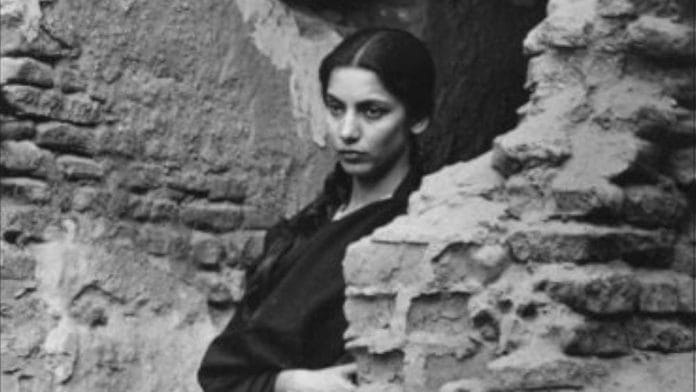Mrinal Sen’s Khandhar, released in 1984, isn’t a film to be understood through dialogues alone. It requires patient engagement with its silences and lingering glances. After all, Khandhar — The Ruins — is a story of passive, endless waiting for its women characters.
The film represents Indian parallel cinema at its most poetic and introspective. Based on Premendra Mitra’s Bengali short story Telenapota Abishkar, Khandhar marked Sen’s departure from overtly political films such as Interview (1971), Calcutta 71 (1972), Padatik (1973), and Oka Oori Katha (1977). Instead, it explores escapism, longing, and the contrast between the hustle of city life and the slow decay of a remote rural world.
Three urban friends — Subhash, a photographer (Naseeruddin Shah), Dipu (Pankaj Kapur), and Anil (Annu Kapoor) — make a trip to Dipu’s ancestral village and its ruins. There they meet Jamini (Shabana Azmi) and her blind, paralysed mother, living in a decaying mansion, sustained only by hope.
Azmi’s portrayal of Jamini stands above the rest of the cast. It is a deeply layered performance conveyed largely through close-ups, her eyes capturing stillness, helplessness, and suppressed yearning.
Khandhar’s silences resonated with audiences in India and abroad. It won National Awards for Best Director and Best Editing, with Azmi taking home Best Actress.
Internationally, it earned the Grand Prize at the Chicago International Film Festival, the Special Jury Prize in Montreal, and was screened in Cannes’ Un Certain Regard section.
Ruins, suffocation, and more
Khandhar’s emotional core lies in what is left unsaid. Jamini and Subhash share moments of unspoken yearning, their shifting gazes holding promise, forbidden longing, and ambiguity that rises above words.
Another conversation unfolds between the ruins and the camera. Cinematographer KK Mahajan and editor Mrinmoy Chakraborty capture the silent, crumbling structures as more than backdrops. They are metaphors for emotional decay and inner desolation. Minimalist visuals and sparse sound slow the passage of time, intensify atmosphere, and underline human fragility.
Jamini’s mother, oblivious to reality, clings to the belief that a distant cousin — Jamini’s suitor — will return. She does not know he is long gone, married, and settled in the city. Jamini knows the truth but has never found the strength to tell her, fearing it would break her.
Azmi’s character is a woman quietly suffocated by circumstance. Sen allows her emotional outburst to surface only in the final moments, when Subhash, like the cousin she once waited for, leaves.
In a moment of frustration, when her mother insists she speak to Subhash about marriage, she snaps: “Bhagwan ne tumhara sab kuch toh le liya—haath, aankhein—phir tumhe goonga bhi bana diya hota… (God took everything from you—hands, eyes—why not your ability to speak).” Her words trail off, unfinished, as guilt overtakes her.
She embraces her mother and breaks down, finally letting grief rise to the surface.
The ruins in the title are both literal and metaphorical — the crumbling village backdrop represents the stalled, decaying lives of Jamini and her mother. Even at the film’s end, no hope is offered for their suffering.
At departure, Subhash’s hesitation and sudden leap from the cart reveals his internal turmoil. His final act is to take a photograph of Jamini, framed by her ruined home, a haunting image he will carry forever.
Shah’ Subhash embodies quiet empathy and helplessness. He is both an observer and an unwitting participant. The camera, his camera, becomes both a barrier and a fragile medium of connection between the audience and Jamini’s suffering.
Beauty in the broken
Dialogue in Khandhar is sparse, but meaning isn’t.
Jamini’s longing, Subhash’s empathy, the mother’s hopeful delusion, the crumbling walls – each carries the weight of a life suspended between what was promised and what remains.
In this film, Sen crafts a story from silence and finds beauty in the broken. That is why Khandhar remains his most poetic work. It is a cinema of nuance, light and dust, of unspoken bonds that bind.
The final scene: a still photograph of Jamini standing in ruins steeped in longing, lingers long after the film ends.
Cast: Shabana Azmi, Naseeruddin Shah, Pankaj Kapur, Annu Kapoor
Director: Mrinal Sen
Producer: Jagadish Choukhani, Pushpa Choukhani
Composer: Bhaskar Chandavarkar
Cinematographer: KK Mahajan
(Edited by Prashant)






